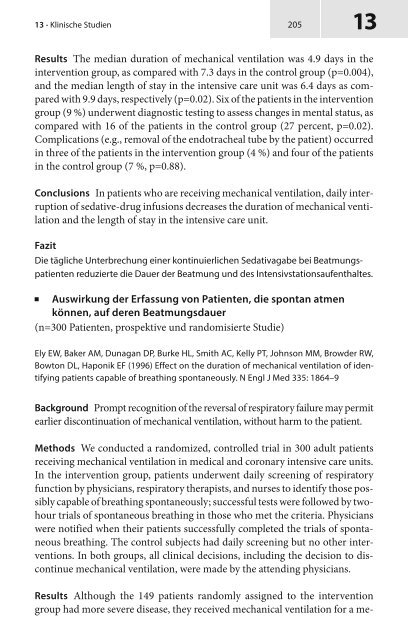Intensivmedizin Fragen und Antworten
Sie wollen auch ein ePaper? Erhöhen Sie die Reichweite Ihrer Titel.
YUMPU macht aus Druck-PDFs automatisch weboptimierte ePaper, die Google liebt.
13 · Klinische Studien<br />
205<br />
13<br />
Results The median duration of mechanical ventilation was 4.9 days in the<br />
intervention group, as compared with 7.3 days in the control group (p=0.004),<br />
and the median length of stay in the intensive care unit was 6.4 days as compared<br />
with 9.9 days, respectively (p=0.02). Six of the patients in the interven tion<br />
group (9 %) <strong>und</strong>erwent diagnostic testing to assess changes in mental status, as<br />
compared with 16 of the patients in the control group (27 percent, p=0.02).<br />
Complications (e.g., removal of the endotracheal tube by the patient) occurred<br />
in three of the patients in the intervention group (4 %) and four of the patients<br />
in the control group (7 %, p=0.88).<br />
Conclusions In patients who are receiving mechanical ventilation, daily interruption<br />
of sedative-drug infusions decreases the duration of mechanical ventilation<br />
and the length of stay in the intensive care unit.<br />
Fazit<br />
Die tägliche Unterbrechung einer kontinuierlichen Sedativagabe bei Beatmungspatienten<br />
reduzierte die Dauer der Beatmung <strong>und</strong> des Intensivstationsaufent haltes.<br />
jAuswirkung der Erfassung von Patienten, die spontan atmen<br />
können, auf deren Beatmungsdauer<br />
(n=300 Patienten, prospektive <strong>und</strong> randomisierte Studie)<br />
Ely EW, Baker AM, Dunagan DP, Burke HL, Smith AC, Kelly PT, Johnson MM, Browder RW,<br />
Bowton DL, Haponik EF (1996) Effect on the duration of mechanical ventilation of identifying<br />
patients capable of breathing spontaneously. N Engl J Med 335: 1864–9<br />
Backgro<strong>und</strong> Prompt recognition of the reversal of respiratory failure may permit<br />
earlier discontinuation of mechanical ventilation, without harm to the patient.<br />
Methods We conducted a randomized, controlled trial in 300 adult patients<br />
receiving mechanical ventilation in medical and coronary intensive care units.<br />
In the intervention group, patients <strong>und</strong>erwent daily screening of respiratory<br />
function by physicians, respiratory therapists, and nurses to identify those possibly<br />
capable of breathing spontaneously; successful tests were followed by twohour<br />
trials of spontaneous breathing in those who met the criteria. Physicians<br />
were notified when their patients successfully completed the trials of spontaneous<br />
breathing. The control subjects had daily screening but no other interventions.<br />
In both groups, all clinical decisions, including the decision to discontinue<br />
mechanical ventilation, were made by the attending physicians.<br />
Results Although the 149 patients randomly assigned to the intervention<br />
group had more severe disease, they received mechanical ventilation for a me-


